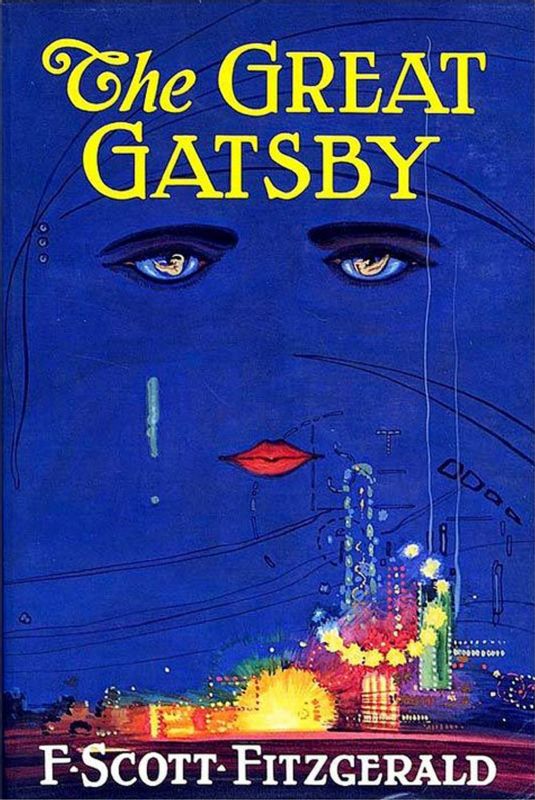- Home
- News, Articles & Reviews
- All Entertainment
- Art
- Attractions
- Book Review
- Comedy
- Culture
- Experiences
- Film
- Film Review
- Gaming
- Gaming Review
- General
- Lifestyle
- Literature
- Local Answers, Local Personalities
- Music
- Theatre
- TV
We are hiring! Please click here to join our growing magazine delivery team in Gloucestershire!
Areas
Entertainment
Archive

Book Club Picks: ‘These people are richer than God’ – F. Scott Fitzgerald’s ‘The Great Gatsby’ and Kevin Kwan’s ‘Crazy Rich Asians’
All Areas > Entertainment > Literature
Author: Rose Page, Posted: Wednesday, 10th July 2019, 10:00
Rose Page is a Cheltenham local and college lecturer in English. She has a Masters in Modern and Contemporary Literature, Culture and Thought, as well as a Bachelors in English Literature & Philosophy.
Her monthly feature, ‘Book Club Picks’, will see Rose choose two books – one classic, one modern – with suggestions on discussion points for book clubs, as well as a brief description and comparison to other publications for more relaxed readers.
High summer is my favourite time to re-read Fitzgerald’s classic novel, ‘The Great Gatsby’.
Sitting in a sun-dappled garden (or, ideally, on some far-flung exotic beach...), cocktail in hand, you can easily imagine you are part of the exclusive world of hedonism and luxury that Fitzgerald depicts.
A perfect reading companion is Kevin Kwan’s 2013 novel Crazy Rich Asians, recently enjoying a peak in popularity thanks to the release of a film adaptation starring Gemma Chan and Michelle Yeoh.
Very much a Gatsby for the 21st Century, Kwan’s novel replaces whispered gossip with the bleep of a smartphone and the classic cars with private Lear jets.
Both novels are visually rich – evoking images of palatial houses full of beautiful objects, unparalleled parties where only the most extravagant entertainment or food is on offer, impeccably educated and immaculately presented people.
Yet at the core of both novels lies money and its corrupting influence – on friendships, families and romance. Money, according to both Fitzgerald and Kwan, fails to bring happiness, but can buy a very convincing illusion of it. The danger lies when someone appears who can see through this illusion and expose the ugliness beneath the beautiful veneer.
The Classic Choice: ‘The Great Gatsby’ – F. Scott Fitzgerald (1925)
You’ll like this if: You enjoy reading around American history, particularly the Jazz Age and Prohibition, or you have read/seen plays by Arthur Miller, Eugene O’Neill or Tennessee Williams that all also explore this new form of tragedy where our tragic hero is an ordinary man who finds himself in extraordinary circumstances.
You might have seen Baz Luhrmann’s excellent film adaptation of the novel with its innovative rap soundtrack that calls our attention to the novel’s more universal themes of inequality, ambition and unrequited love.
What’s it about?: Fitzgerald’s narrator Nick takes an unusual narrative position. Although he is a homodiegetic narrator (a term that means he is a part of the same story that he tells), he Is on the periphery, almost a voyeur into the privileged lives of the other characters.
In this way, he is highly relatable to the reader, who finds themselves judging the rest of them alongside him. We follow his journey over one long, hot summer, as he moves into a small house next to Gatsby’s sprawling estate and comes to befriend the elusive yet charismatic millionaire.
Intrigued by Gatsby’s utterly lavish parties that the host does not actually seem to himself enjoy, Nick discovers that they are all a ruse to impress his cousin Daisy, Gatsby’s first and only love, who lives just across the bay. Unfortunately, she is married to Tom, an arrogant and egoistic individual with an inferiority complex and a temper.
Discussion questions:
• How does Fitzgerald use language to convey the extravagance of Gatsby’s parties? Consider his use of synaesthesia (the mixing up of the senses e.g. ‘yellow cocktail music’) and listing (e.g. ‘the whisperings and the champagne and the stars’).
• Cars are a hugely important symbol in the novel. What do you think they represent – escape and freedom, death and destruction, irresponsibility...or something else?
• Geography is key in the world Fitzgerald depicts. What significance do the locations of West Egg, East Egg and the Valley of Ashes hold? Can we interpret the settings as metaphorical – heaven and hell, or the right and wrong side of the tracks (literalised perhaps by the train that runs through the Valley of Ashes)?
• Communication (and cross-communication) is conveyed through telephone calls and the omnipresent rumours amongst the high society characters. What do you think is the relationship between rumour and truth in the novel? Is the distinction blurred at times?
• Sartorial language (language concerning clothing) abounds throughout the story. Why is this so central to the narrative?
• Do you interpret Gatsby’s love as impassioned and pure or dangerously obsessive? Does he deserve to get Daisy or is he her stalker?
• Are any of the characters in the novel victims? Or must they all be held responsible for their actions? Consider Myrtle, George Wilson and Gatsby himself.
The Modern Choice: Crazy Rich Asians – Kevin Kwan (2013)
You’ll like this if: Well, if you like 'The Great Gatsby'! You might also be a fan of other novels depicting insular, competitive societies, such as Donna Tartt’s ‘The Secret History’ or Curtis Sittenfeld’s ‘Prep’.
If you are interested in the emergence of China on the world economic stage, this is also a fascinating read. We can also interpret it as a Bildungsroman (a coming of age novel) for the character Rachel, so if you enjoy classic Bildungsroman narratives such as Harper Lee’s ‘To Kill a Mockingbird’, you may enjoy Kwan’s novel.
What’s it about?: The novel follows an ensemble structure – that is, there are multiple characters and plotlines that occasionally meet and interweave, culminating in a big event (in this case, the society wedding of Araminta and Colin Kwan) where all plotlines converge.
Each chapter is named accordingly after the characters it follows. Most notable are the characters of Nick and Rachel – two university professors in the USA who plan to return to Nick’s homeland of Singapore so he can act as best man at the wedding.
Although he has been with Rachel for a number of years, it becomes quickly and abundantly clear that he has not disclosed to her much about his personal history. She discovers his family are vastly wealthy and live a highly privileged life amongst the elite of the island.
As we readers judge the excesses of first-class suites on planes and lavish banquets, she too is judged – and found lacking – by his matriarchal family structure. Another key plot strand is that of Nick’s beautiful cousin Astrid (yes, another protagonist with another untouchable, alluring cousin...) who suspects her husband of infidelity.
Be prepared for an onslaught of other characters (it's difficult to remember all the names as each bitchy, vain glorious, designer-clad individual merges into the other) and various jaw-dropping displays of wealth as you turn the pages.
Discussion questions:
• The novel is peppered with dark humour - from the exploits of Bernard and Kitty to the witticisms of Nick's mother's bible study group. Is our amusement tinged with disdain or judgement? Or do these characters seem more like caricatures?
• Kwan begins the novel with a quote from Napoleon, stating that we must let China sleep, 'for when she wakes she will shake the world'. Were you shocked to read of the levels of wealth on display in China and the other countries/states depicted? Is this how you viewed Chinese society before reading?
• As in Fitzgerald's novel, sartorial language is used throughout. What effect does it have here, especially when we are encouraged to view the society through Rachel's eyes?
• Arguably, Rachel undergoes what writers call a 'double journey' in the novel. There is the literal journey, from the USA to Singapore and its surrounds, and also the more metaphorical, emotional journey from her initial naivety to new knowledge and understanding about herself and her place in the world. Find evidence to show that she has completed this journey and reached a point of maturity by the end of the novel.
• Gossip and rumour are just as important here as in the roaring 20's world of Fitzgerald's characters. What is the role of false rumours in the novel? Consider the ongoing joke about Rachel being one of the 'Taiwan Plastic Chus' and the way Chinese whispers spread at Araminta's bachelorette party.
• The novel explores forms of racism you may not be familiar with as a UK citizen. Terms like 'ABC' (American-Born Chinese') or 'Mainland Chinese' are used with derision. Did you interpret these epithets as racist, classist or simply judgemental? How divided does Singaporean society seem to be?
• In Gatsby, 'old' and 'new' money is divided geographically in West and East Egg. How are they divided in Kwan's novel (Peik Lin's family are a good example of 'new money')?
• There are extensive footnotes in the novel. Does this help ground the reader in the Chinese languages and help us understand the cultural references...or alienate us further as the text becomes a puzzle to decipher?
• Did you read either novel as a satire (mocking a society for a serious purpose)? How cruelly do you think either author judges the world they are depicting?Other Images
Copyright © 2024 The Local Answer Limited.
Unauthorized use and/or duplication of this material without express and written permission from this site's author and/or owner is strictly prohibited. Excerpts and links may be used, provided that full and clear credit is given to The Local Answer Limited and thelocalanswer.co.uk with appropriate and specific direction to the original content.More articles you may be interested in...


© 2024 The Local Answer Limited - Registered in England and Wales - Company No. 06929408
Unit H, Churchill Industrial Estate, Churchill Road, Leckhampton, Cheltenham, GL53 7EG - VAT Registration No. 975613000You are leaving the TLA website...
You are now leaving the TLA website and are going to a website that is not operated by us. The Local Answer are not responsible for the content or availability of linked sites, and cannot accept liability if the linked site has been compromised and contains unsuitable images or other content. If you wish to proceed, please click the "Continue" button below:




